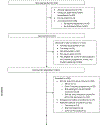A randomized controlled trial of a computer-based brief intervention for victimized perinatal women seeking mental health treatment
- PMID: 30088145
- PMCID: PMC6367105
- DOI: 10.1007/s00737-018-0895-1
A randomized controlled trial of a computer-based brief intervention for victimized perinatal women seeking mental health treatment
Abstract
Intimate partner victimization (IPV) during the perinatal period is associated with adverse outcomes for the woman, her developing fetus, and any children in her care. Maternal mental health concerns, including depression and anxiety, are prevalent during the perinatal period particularly among women experiencing IPV. Screening and interventions for IPV targeting women seeking mental health treatment are lacking. In the current study, we examine the feasibility, acceptability, and the preliminary efficacy of a brief, motivational computer-based intervention, SURE (Strength for U in Relationship Empowerment), for perinatal women with IPV seeking mental health treatment. The study design was a two-group, randomized controlled trial with 53 currently pregnant or within 6-months postpartum women seeking mental health treatment at a large urban hospital-based behavioral health clinic for perinatal women. Findings support the acceptability and feasibility of the SURE across a number of domains including content, delivery, and retention. All participants (100%) found the information and resources in SURE to be helpful. Our preliminary results found the degree of IPV decreased significantly from baseline to the 4-month follow-up for the SURE condition (paired t-test, p < 0.001), while the control group was essentially unchanged. Moreover, there was a significant reduction in emotional abuse for SURE participants (p = 0.023) relative to participants in the control condition. There were also reductions in physical abuse although non-significant (p = 0.060). Future work will test SURE in a larger, more diverse sample. ClinicalTrials.gov Identifier: NCT02370394.
Keywords: Computer intervention; Intimate partner victimization; Perinatal.
Conflict of interest statement
Conflicts of interest: No competing financial interests exist for authors Golfo Tzilos Wernette and Christina Raker. Caron Zlotnick’s husband is a consultant for Soberlink
Figures
Similar articles
-
Computerized intervention for reducing intimate partner victimization for perinatal women seeking mental health treatment: A multisite randomized clinical trial protocol.Contemp Clin Trials. 2020 Jun;93:106011. doi: 10.1016/j.cct.2020.106011. Epub 2020 Apr 17. Contemp Clin Trials. 2020. PMID: 32305456 Free PMC article.
-
Intimate partner violence victimization during pregnancy increases risk of postpartum depression among urban adolescent mothers in South Africa.Reprod Health. 2023 May 2;20(1):68. doi: 10.1186/s12978-023-01605-z. Reprod Health. 2023. PMID: 37131269 Free PMC article.
-
Problem solving therapy (PST) tailored for intimate partner violence (IPV) versus standard PST and enhanced usual care for pregnant women experiencing IPV in rural Ethiopia: protocol for a randomised controlled feasibility trial.Trials. 2020 Jun 1;21(1):454. doi: 10.1186/s13063-020-04331-0. Trials. 2020. PMID: 32487250 Free PMC article.
-
Current Reports on Perinatal Intimate Partner Violence.Curr Psychiatry Rep. 2017 May;19(5):26. doi: 10.1007/s11920-017-0778-6. Curr Psychiatry Rep. 2017. PMID: 28417270 Review.
-
Intimate Partner Violence and Perinatal Post-Traumatic Stress and Depression Symptoms: A Systematic Review of Findings in Longitudinal Studies.Trauma Violence Abuse. 2022 Jul;23(3):733-747. doi: 10.1177/1524838020976098. Epub 2020 Nov 28. Trauma Violence Abuse. 2022. PMID: 33252020
Cited by
-
Safe Pregnancy intervention for intimate partner violence: a randomised controlled trial in Norway among culturally diverse pregnant women.BMC Pregnancy Childbirth. 2022 Feb 21;22(1):144. doi: 10.1186/s12884-022-04400-z. BMC Pregnancy Childbirth. 2022. PMID: 35189843 Free PMC article. Clinical Trial.
-
The global prevalence and its associated factors toward domestic violence against women and children during COVID-19 pandemic-"The shadow pandemic": A review of cross-sectional studies.Womens Health (Lond). 2022 Jan-Dec;18:17455057221095536. doi: 10.1177/17455057221095536. Womens Health (Lond). 2022. PMID: 35441537 Free PMC article. Review.
-
Identification and Management of Domestic and Sexual Violence in Primary Care in the #MeToo Era: an Update.Curr Psychiatry Rep. 2019 Feb 8;21(2):12. doi: 10.1007/s11920-019-0991-6. Curr Psychiatry Rep. 2019. PMID: 30734100 Review.
-
Intimate Partner Violence and Electronic Health Interventions: Systematic Review and Meta-Analysis of Randomized Trials.J Med Internet Res. 2020 Dec 11;22(12):e22361. doi: 10.2196/22361. J Med Internet Res. 2020. PMID: 33306030 Free PMC article.
-
Caring for Mothers: A Narrative Review on Interpersonal Violence and Peripartum Mental Health.Int J Environ Res Public Health. 2021 May 16;18(10):5281. doi: 10.3390/ijerph18105281. Int J Environ Res Public Health. 2021. PMID: 34065628 Free PMC article. Review.
References
-
- Bacchus LJ, Bullock L, Sharps P, Burnett C, Schminkey DL, Maria Buller A, Campbell J (2016). Infusing technology into perinatal home visitation in the United States for women experiencing intimate partner violence: exploring the interpretive flexibility of an mHealth intervention. J Med Internet Res 18(11): e302 doi:10.2196/jmir.6251 - DOI - PMC - PubMed
-
- Boris N, Zeanah C (1999) Disturbances and disorders of attachment in infancy. Infant Ment Health J 20:1–9
-
- Brown JB, Lent B, Schmidt G, Sas G (2000) Application of the Woman Abuse Screening Tool (WAST) and the WAST-Short in the family practice setting. J Fam Pract 49:896–903 doi:doi.org/10.1016/j.amepre.2009.01.024 - DOI - PubMed
Publication types
MeSH terms
Associated data
Grants and funding
LinkOut - more resources
Full Text Sources
Other Literature Sources
Medical


